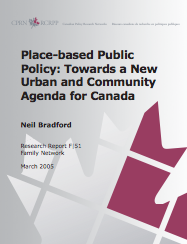Recently there has been growing awareness of the importance of cities, large and small, as strategic spaces in the age of globalization. They are the places where today’s major public policy challenges are being played out. Countries that invest in their cities and communities are likely to be at the forefront of progressive change in the 21st century.
This Research Report explores ideas and options for a new approach to urban and community policy in Canada. The analysis builds on the growing body of research demonstrating how “place matters” to the quality of life for all citizens and to the prosperity of nations. Economic geographers studying innovation emphasize qualities of the “local milieu” that are crucial for knowledge-intensive production. Scholars examining social inclusion reveal the barriers individual and families face in moving forward when their neighbourhoods limit access to quality services and networks. Environmental analysts stress that urban centres are where major ecological stresses converge, and that decisions taken locally about land use, transportation, and development are crucial for sustainability.
All this research reveals the difference “place quality” makes to public policy outcomes. But what measures and mechanisms are required to act on this knowledge? How can governments at all levels reposition themselves to meet the challenges converging in urban areas?
 This Research Report calls for a place-based public policy framework. In so doing, it takes a broader view than is often the case in assessing the problems and prospects of cities. An urban perspective concentrates on physical infrastructures and the powers available to municipalities. A community perspective focuses on social infrastructures and the networks for democratic participation. The place-based framework recognizes the importance of both perspectives, and seeks their integration through a mix of public policies responding to the needs of cities of all sizes and locations.
This Research Report calls for a place-based public policy framework. In so doing, it takes a broader view than is often the case in assessing the problems and prospects of cities. An urban perspective concentrates on physical infrastructures and the powers available to municipalities. A community perspective focuses on social infrastructures and the networks for democratic participation. The place-based framework recognizes the importance of both perspectives, and seeks their integration through a mix of public policies responding to the needs of cities of all sizes and locations.
The Research Report concludes that place-based policy-making, properly designed and implemented, can help governments meet the key challenges and opportunities currently converging in urban spaces. A main message is that Canadian policy communities are now well- positioned for a concerted round of policy learning and practical experimentation. They can learn from elsewhere, drawing on the experiences of other jurisdictions, and they can build from within, reflecting on several promising collaborations already underway in Canadian cities.
Download the PDF
Format
Source





